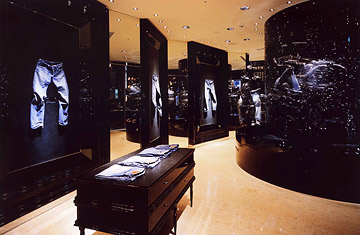
Inside Heddie Lovu's boutique in Tokyo's Omotesando Hills shopping complex.
(2 of 2)
"When people were all going in the direction thinking that it would be O.K. to make low-priced clothes at a mediocre level, I just went in the opposite way," explains Homma. He was reacting to Japan's shrinking artisanal market and to the exodus of its production facilities to China. Not only were factories closing, but the high-volume plants that remained in business were filled with foreigners, as if they were outposts of Chinese factories.
"They will all go home eventually," says Homma. "The time will come when we won't be able to make fine clothes anymore because only the high-volume plants will survive. Fine artisans will all be forced out of business."
Like Homma, Sachiyo Ikemoto, 33, the designer behind Japanese denim brand Heddie Lovu, cherishes Japanese artisanal work. "I wanted a good-looking pair of jeans that I could wear for decades," she says. "Like a denim version of an Herms Birkin bag. But I couldn't find them, so I had to make them myself."
To create the jeans without compromising on color, shape or texture, Ikemoto spent a year living in Japan's denim mecca, Okayama Prefecture, working with local craftsmen to develop everything from the thread to the design. Today Heddie Lovu jeans are among the best-selling premium jeans at Tokyo's prime shopping complex Omotesando Hills.
"To me, brands are all about individuality now. Logos are not important," says Kenji Ikeda, 33, a handbag designer who once worked at Givenchy and has started his own no-logo label. When Ikeda launched his brand in 2003, the first thing he did was hire two full-time craftsmen. "If I got a high-caliber staff to create high-quality products, I believed that it would yield results," recalls Ikeda, whose concept proved to be right. In 2006, sales of his handbags increased 170% over the previous year.
"People are learning, and the market is maturing," says Kiyoshi Takimoto, a co-designer, with Kazuhiro Kushida, of Coffy, a new Japanese leather-accessories brand that is popular among twentysomething women. "Luxury brands without quality are going nowhere and are only ephemeral."
For his part, Coates says he applauds consumers who seek more exceptional forms of luxury, which, according to him, owe their existence to a global respect for the skills needed to create luxury goods. In the same spirit, Mastermind Japan's Homma says he always credits the people involved in his creative process, from textile workers to patternmakers. "I'm always moved by their know-how," he says. "That's what propels me to design. There are still so many fine processing technologies buried in Japan that can surprise the world. My job is just to introduce the technology and beauty of 'made in Japan' to the world."